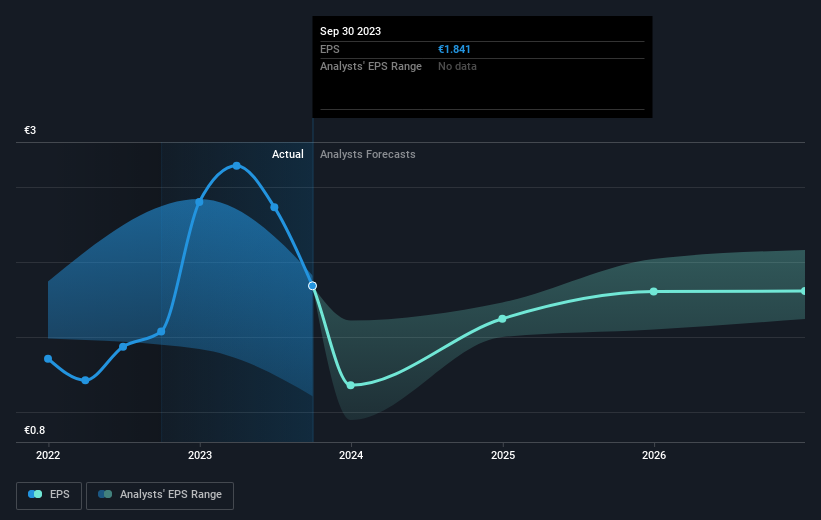Stock Analysis
- Spain
- /
- Electric Utilities
- /
- BME:ELE
Endesa (BME:ELE) sheds 4.1% this week, as yearly returns fall more in line with earnings growth

Ideally, your overall portfolio should beat the market average. But every investor is virtually certain to have both over-performing and under-performing stocks. At this point some shareholders may be questioning their investment in Endesa, S.A. (BME:ELE), since the last five years saw the share price fall 19%. Unfortunately the share price momentum is still quite negative, with prices down 8.4% in thirty days.
Since Endesa has shed €799m from its value in the past 7 days, let's see if the longer term decline has been driven by the business' economics.
View our latest analysis for Endesa
To paraphrase Benjamin Graham: Over the short term the market is a voting machine, but over the long term it's a weighing machine. One way to examine how market sentiment has changed over time is to look at the interaction between a company's share price and its earnings per share (EPS).
While the share price declined over five years, Endesa actually managed to increase EPS by an average of 4.4% per year. Given the share price reaction, one might suspect that EPS is not a good guide to the business performance during the period (perhaps due to a one-off loss or gain). Or possibly, the market was previously very optimistic, so the stock has disappointed, despite improving EPS.
Given EPS is up and the share price is down, it's clear the market is more concerned about the business than it was previously. Generally speaking, though, if the company can keep growing EPS then the share price will eventually follow.
The graphic below depicts how EPS has changed over time (unveil the exact values by clicking on the image).

We know that Endesa has improved its bottom line lately, but is it going to grow revenue? You could check out this free report showing analyst revenue forecasts.
What About Dividends?
As well as measuring the share price return, investors should also consider the total shareholder return (TSR). The TSR is a return calculation that accounts for the value of cash dividends (assuming that any dividend received was reinvested) and the calculated value of any discounted capital raisings and spin-offs. Arguably, the TSR gives a more comprehensive picture of the return generated by a stock. We note that for Endesa the TSR over the last 5 years was 8.8%, which is better than the share price return mentioned above. And there's no prize for guessing that the dividend payments largely explain the divergence!
A Different Perspective
Endesa provided a TSR of 5.1% over the last twelve months. But that was short of the market average. On the bright side, that's still a gain, and it's actually better than the average return of 1.7% over half a decade This suggests the company might be improving over time. While it is well worth considering the different impacts that market conditions can have on the share price, there are other factors that are even more important. Consider risks, for instance. Every company has them, and we've spotted 2 warning signs for Endesa you should know about.
Of course, you might find a fantastic investment by looking elsewhere. So take a peek at this free list of companies we expect will grow earnings.
Please note, the market returns quoted in this article reflect the market weighted average returns of stocks that currently trade on Spanish exchanges.
Valuation is complex, but we're helping make it simple.
Find out whether Endesa is potentially over or undervalued by checking out our comprehensive analysis, which includes fair value estimates, risks and warnings, dividends, insider transactions and financial health.
View the Free AnalysisHave feedback on this article? Concerned about the content? Get in touch with us directly. Alternatively, email editorial-team (at) simplywallst.com.
This article by Simply Wall St is general in nature. We provide commentary based on historical data and analyst forecasts only using an unbiased methodology and our articles are not intended to be financial advice. It does not constitute a recommendation to buy or sell any stock, and does not take account of your objectives, or your financial situation. We aim to bring you long-term focused analysis driven by fundamental data. Note that our analysis may not factor in the latest price-sensitive company announcements or qualitative material. Simply Wall St has no position in any stocks mentioned.
About BME:ELE
Endesa
Endesa, S.A. engages in the generation, distribution, and sale of electricity in Spain, Portugal, France, Germany, Morocco, Italy, the United Kingdom, Singapore, and internationally.
Fair value with moderate growth potential.

